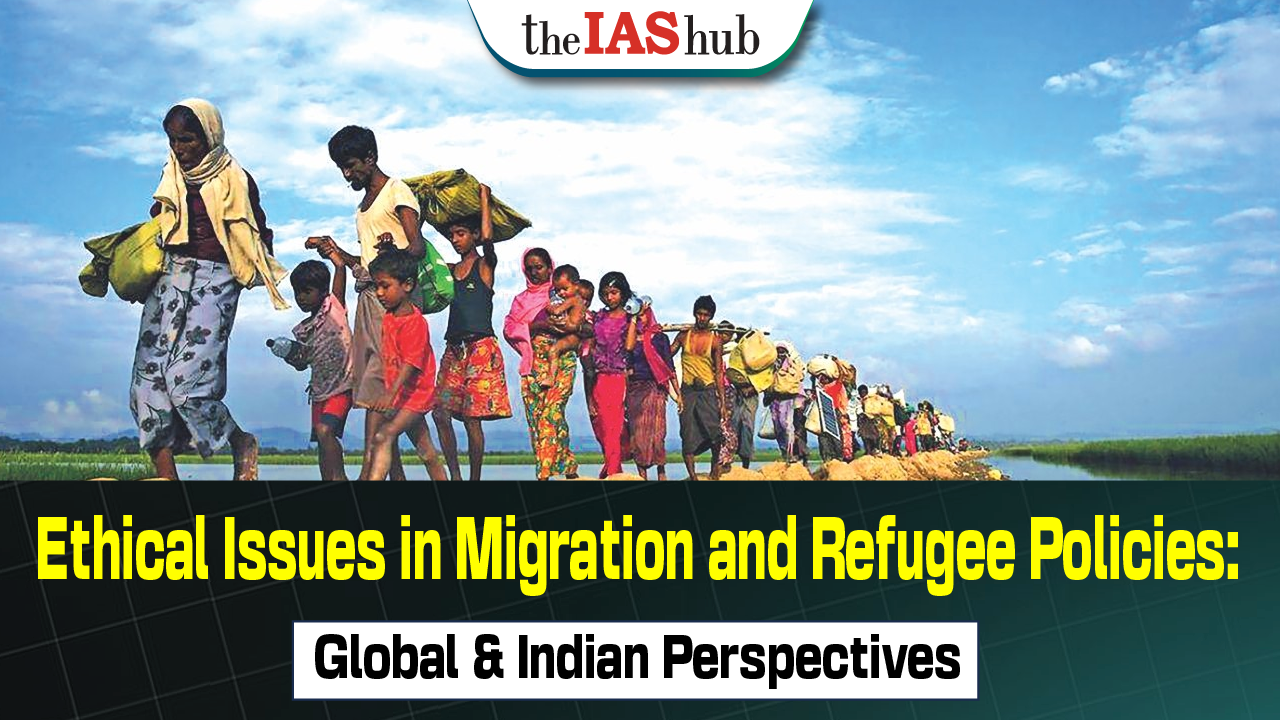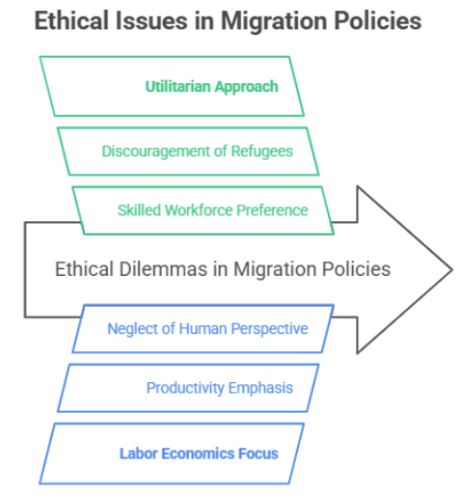Explore ethical issues in migration and refugee policies worldwide. Learn impacts on individuals, origin & destination countries, rights, and solutions for fair, human-centric migration governance.


Migration shapes economies, cultures, and societies worldwide, yet it often raises complex moral and legal challenges. Addressing ethical issues in migration and refugee policies is essential to ensure fairness, human rights, and social harmony.
Migration is both seen as an asset and a liability by the world. In order to utilize asset and shun away liability, countries around the world devise policies and laws as per their suitability. Such policies often lack ethical principles.
|
Stakeholders |
Issues involved |
Individual |
|
Origin Country |
|
Destination Country |
|
Rescuers |
|
|
International Organisation |
|

Example:
Example:
|
Spheres |
When Ethical Principles are not incorporated |
When Ethical Principles are Incorporated |
|
Citizenship Status |
Treated like a secondary citizen Ex. Migrants in Qatar and Saudi Arabia, Rohingaya in Bangladesh |
Treated equally in different arenas of Life Ex. Chakma and Hajong refugees in India |
|
Rights |
Social, Political and Economic rights are not entitled to them. Ex. Kafala system in Qatar |
Enjoy all rights in effective ways, this helps them to live a decent life Ex. Tech Migrants from India to USA |
|
Potential |
In adverse situations they are not able to give their best in different arena. Ex. Refugees from Iraq and Syria |
Due to equal opportunities, they are able to fully utilize their potential. Ex. Jews and Parasi Community in India |
|
Activities |
Persecution of refugees lead them to indulge in illegal actions like trafficking, drug abuse, terrorism etc. Ex. Trade of drug substances by refugees from Myanmar in North Eastern states of India. |
Along with their development, they contribute to the development of society and the country at large. Ex. Star Football player of France, Kylian Mbappe has deep roots in Africa Similarly, many Migrants are star players of European Football leagues |
|
Peace & Security |
Improper integration with society leads to various conflicts such as ideological, psychological etc. Ex. Issues of Rohingyas exodus |
They are well integrated into society. Principles of Tolerance, sympathy etc. are being upheld in society. Ex. Contribution of Parsis in India, jews in USA in economic development |


Refine your answer writing skills and elevate your UPSC preparation with personalized support and expert feedback.
Fill out the form to get started with the program or any other enquiries !








Are you dreaming of becoming an IAS officer? Then, IAShub can be your best guide. It is one of the Best IAS Coaching in Delhi. Many students who want to clear the UPSC exam join IAShub for learning. The institute gives both online and offline classes. Their teachers are experienced and helpful. They easily explain every topic. Students also get notes, tests, and tips to do well in the exam.
IAShub is in Delhi and is trusted by many UPSC students. It offers coaching for every part of the UPSC exam – Prelims, Mains, and Interview. The classes are simple and easy to understand. The teachers are experts and guide students in the right way. IAShub is also known for its helpful notes, test series, and answer-writing practice. IAShub is the best coaching in Delhi and also gives UPSC Online Classes. This helps students from any place in India to learn. The online classes are live and also recorded. So, students can watch them anytime. These classes cover the full UPSC syllabus.
Here are some important services provided by IAShub:
The UPSC Civil Services Exam has three parts:
This exam is tough, but with the right guidance, it becomes easy to manage. Students must study smart and stay regular.
IAShub supports students from the beginning to the end. It gives the right books, tests, and notes. The classes are easy to follow, and the teachers are always ready to help. Students get personal doubt sessions too. The test series and answer checking help students learn where they need to do better. Also, free study materials save time and money.
IAShub also guides students during the final stage – the interview. Experts take mock interviews and give useful tips. This full support makes IAShub one of the best IAS coaching in Delhi.